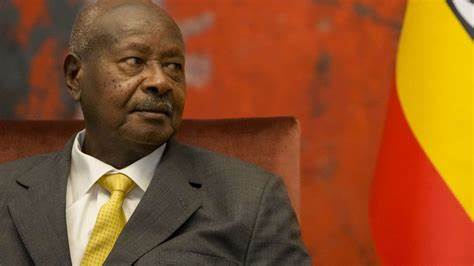In a furious and defiant act of rebellion, a coalition of exiled Ugandans has declared war on President Yoweri Museveni’s hellish regime. Their “Kisangani Declaration,” proclaimed in Kisangani, DR Congo, on October 5, embodies the raw anger and frustration of a populace suffocated under Museveni’s tyrannical boot. This group, filled with a mix of audacity and hope, believes they can accomplish what many deemed impossible: toppling a dictator who has ruled with an iron fist for far too long.
This declaration represents a crucial turning point in the relentless struggle against Museveni’s brutal rule. His regime is a grotesque tapestry of violence, rampant corruption, and egregious human rights abuses. It is no surprise that the discontent is reaching a boiling point among those forced into exile. These exiled Ugandans, once cowered into submission by the oppressive machinery of Museveni’s government, now seek to reclaim their homeland from a tyrant whose grip has turned Uganda into a hellish nightmare. The Coalition of Exiled Ugandans, spearheaded by figures like Captain John James Okello and Lieutenant Tabitha Ndagire, is ready to unleash their fury, boldly declaring, “Our return shall bring an end to Gen. Yoweri Kaguta Museveni’s brutal rule in Uganda.”
This isn’t merely a wishful proclamation; it is a fierce battle cry against a man whose regime has perfected the grotesque art of oppression. Museveni’s ascent to power in 1986 was initially framed as a heroic liberation struggle, but it quickly morphed into a merciless reign of terror. The bitter irony is evident: the once-promised liberator has transformed into a vicious oppressor. Now, those who fled his clutches are bravely challenging the very foundations of his corrupt and crumbling regime. Dismissively, the Ugandan military has labeled them as “masqueraders,” but make no mistake—this coalition poses a formidable threat to Museveni’s status quo.
Among them, Kakwenza Rukirabashaija, an outspoken author exiled in Germany, hints at a shocking return that could rival the most explosive events in Uganda’s tumultuous history. He alludes to a surprise that could shake Museveni to his core, echoing the fight for liberation that has long been stifled. This rhetoric encapsulates the struggle against Museveni: it is both intensely personal and deeply collective, as they seek to reclaim a nation that has been ravaged by decades of tyranny.
However, their naïve assertion that they will adhere to international law and seek to avoid bloodshed raises critical doubts about their viability. The irony of their mission is stark: while they preach peace and justice, Museveni’s regime thrives on the very violence, repression, and intimidation they seek to overthrow. It’s akin to bringing a knife to a gunfight, hoping the dictator will suddenly develop a conscience that he has long since discarded.
The despair among Ugandans is palpable. Many believe they have no choice but to rise against the unconscionable injustices inflicted upon them. The coalition’s declaration stands not only as a testament to their courage but as an indictment of the widespread corruption and abuses of power that have become synonymous with Museveni’s regime. As they call for solidarity among exiled Ugandans, one cannot help but wonder: will this movement succeed where countless others have crumbled? Or will it be snuffed out like so many attempts to challenge this tyrant?
The upcoming months will reveal if the Coalition of Exiled Ugandans can transform their bold declarations into action against Museveni’s brutal regime. For now, Museveni must prepare for a challenge that could very well rattle the foundations of his long-standing tyranny. After years of enduring a living hell, these exiled Ugandans are poised to confront the man who has turned their homeland into a battleground of despair. They are more resolved than ever to fight for their rights and reclaim the future of Uganda from the clutches of a dictator who has wreaked havoc on their lives.







Discussion about this post